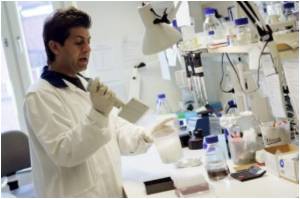
"People in the DRC and many countries in Africa have hoped for a safe, easy-to-use, and effective treatment against sleeping sickness for generations," Dr. Miaka Mia Bilenge said. "We very much look forward to the start of human trials, and we hope that at long last this will give us a tool for sustainable elimination of this dreaded disease."
In pre-clinical studies, the new drug candidate, SCYX-7158, also registered as AN5568, demonstrated safety and the ability to cross the blood-brain barrier making it efficacious against stage 1 and stage 2 of the disease. In addition, its oral formulation, short duration of therapy and excellent pre-clinical safety profile imply that SCYX-7158 (AN5568) could change the way sleeping sickness is treated, reduce its incidence in humans, and contribute to elimination of the disease.
The successful development of this new compound was the result of a unique collaboration between Anacor Pharmaceuticals, a biopharmaceutical company in Palo Alto, California, SCYNEXIS, a drug discovery and development company based in Research Triangle Park, North Carolina, and DNDi, a not-for-profit research and development (R&D) organization that develops new drugs to address the needs of the world's most neglected populations.
"This innovative collaboration, expounding upon the expertise and engagement of two biotech companies and a not-for-profit R&D organization, has brought excellent results thus far, and this in an incredibly short timeframe," said Dr. Bernard P'coul, Executive Director of DNDi. "The message is clear that it is possible to stimulate patient needs-driven R&D for neglected tropical diseases, even if there is no commercial market," added P'coul.
SCYX-7158 (AN5568) is a product of Anacor's novel boron chemistry which has produced a number of compounds with efficacy against a range of fungal, inflammatory and bacterial diseases. Realizing this technology could also be used for neglected diseases, Anacor, with the help of the Sandler Center for Drug Discovery of the University of California, San Francisco, screened its library of boron-based compounds for activity against the sleeping sickness parasites and identified an attractive lead series. In order to ensure further development of these compounds, Anacor approached DNDi, which was actively seeking compounds for its lead optimization program. DNDi, Anacor, SCYNEXIS, and a consortium including Pace University and the Swiss Tropical and Public Health Institute then worked on the series of molecules in pre-clinical studies that led to the development of the compound for which DNDi is filing a dossier for first in man (FIM) studies to enter Phase I clinical trials in Europe.
Advertisement
SCYNEXIS CEO, Dr. Yves Ribeill, said the program is part of SCYNEXIS' policy of contributing to neglected disease projects. "Success so far was in large part due to the work of several organizations working closely together. If we are going to find effective medicines against diseases that exact a terrible toll in developing countries, we need to find new approaches in the discovery process. This program is an example," said Ribeill.
Advertisement












